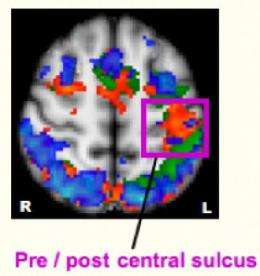Consciousness is the brain's Wi-Fi, resolving competing requests, study suggests

Your fingers start to burn after picking up a hot plate. Should you drop the plate or save your meal? New research suggests that it is your consciousness that resolves these dilemmas by serving as the brain's Wi-Fi network, mediating competing requests from different parts of the body. Published today in the journal Emotion, the study also explains why we are consciously aware of some conflicting urges but not others.
"If the brain is like a set of computers that control different tasks, consciousness is the Wi-Fi network that allows different parts of the brain to talk to each other and decide which action 'wins' and is carried out," said San Francisco State University Assistant Professor of Psychology Ezequiel Morsella, lead author of the study. The study finds that we are only aware of competing actions that involve skeletal muscles that voluntarily move parts of the body, the bicep for example, rather than the muscles in the digestive tract or the iris of the eye.
In lab experiments, participants were trained to identify and report changes in their awareness, or the feeling of being about to make a mistake, while in a state of readiness to perform simple exercises.
The results demonstrated that merely preparing to perform an incompatible action, for example preparing to move simultaneously left and right, triggered stronger changes in awareness than preparing to perform a compatible action or experiencing a conflict that does not engage the muscles that move our bodies. Participants rated changes in their awareness on an eight-point scale and reported an average rating of 4.5 when mentally preparing to perform an incompatible action and an average rating of two for compatible actions.

The findings support a new theory developed by Morsella which predicts that the primary role of consciousness is to bring together competing demands on skeletal muscle. Morsella's theory also proposes that consciousness allows individuals to adapt their actions in the future, for example wearing an oven mitt to hold a hot dish.
The results give credence to an interesting idea that 'thinking is for doing,' a framework psychologists are using to explore the link among consciousness, perception and action. "Our findings add to the growing body of evidence that when you prepare to perform two competing actions you prime the same areas of the brain associated with carrying out that same action," Morsella said.
In a related, but separate study, Morsella and colleagues used fMRI scans to identify the regions of the brain that produce the changes in awareness associated with conflicting urges. The findings were presented at the Proceedings of the Cognitive Neuroscience Society Annual Meeting in April 2008.
"What's interesting is that the changes in awareness that participants felt when preparing to perform conflicting actions was uniquely associated with increased activation of areas of the brain associated with action and perception, as we would expect, and also with working memory, including the pre- and post-central sulcus," Morsella said. "This is consistent with our theory because these brain regions are responsible for consciousness and selecting the right action at the right time."
The authors suggest that both studies identify the common elements underlying all conflicting urges and that the findings shed light on managing addiction and failures of self control.
Source: San Francisco State University (news : web)












